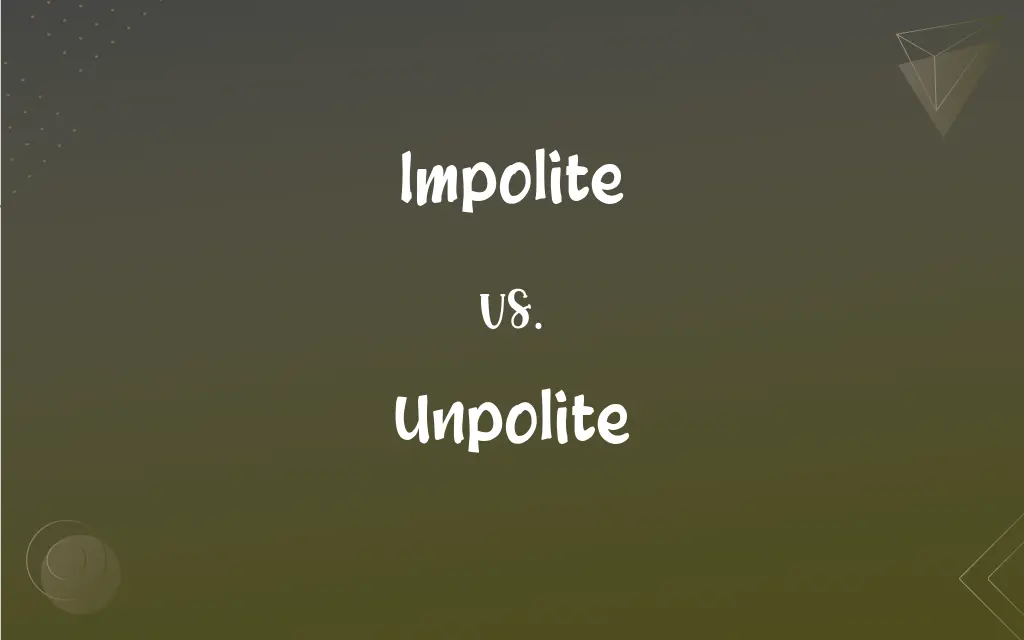Impolite vs. Unpolite: What's the Difference?
Edited by Aimie Carlson || By Janet White || Published on January 10, 2024
Impolite refers to rudeness and lack of manners, widely recognized and used; unpolite is a less common, archaic form conveying the same meaning.

Key Differences
Impolite is a commonly used adjective describing behavior or actions that are rude or lacking in manners. Unpolite, on the other hand, is an archaic and much less frequently used term, but it carries a similar meaning. Both terms denote a breach of social etiquette, yet 'impolite' is more prevalent in modern English usage.
In terms of linguistic evolution, impolite has maintained its relevance and frequency in contemporary usage. Unpolite, however, has largely fallen out of use and is rarely encountered in modern texts or conversations. Despite their similar meanings, impolite is the preferred choice in modern English.
The word impolite is derived from the prefix 'im-' meaning 'not' and polite, meaning courteous or well-mannered. Unpolite combines the prefix 'un-' with polite, also to mean not polite. Both prefixes serve to negate the adjective 'polite,' but 'im-' is more commonly used in this context.
In literature and formal writing, impolite is the go-to word for indicating rudeness or discourtesy. Unpolite, though understandable, might be perceived as outdated or stylistically unusual. Therefore, impolite is more suitable for contemporary communication.
From a grammatical standpoint, both impolite and unpolite function similarly as adjectives. They can be used to modify nouns and express a lack of politeness. However, due to its modern relevance and recognition, impolite is the preferred adjective in both spoken and written English.
ADVERTISEMENT
Comparison Chart
Usage Frequency
Commonly used in modern English
Rarely used, more archaic
Linguistic Evolution
Maintained relevance
Fallen out of use
Derivation
From 'im-' + polite
From 'un-' + polite
Suitability
Preferred in contemporary use
Perceived as outdated
Grammatical Use
Used as an adjective
Used as an adjective
ADVERTISEMENT
Impolite and Unpolite Definitions
Impolite
Not adhering to accepted social standards.
Interrupting someone mid-sentence is impolite.
Unpolite
Showing a lack of manners or courtesy.
Ignoring an invitation without response is unpolite.
Impolite
Showing rudeness or lack of courtesy.
It's impolite to talk loudly in a library.
Unpolite
Not conforming to polite standards.
It's unpolite to not thank someone for a gift.
Impolite
Lacking consideration for others.
It's impolite to ignore someone's greeting.
Unpolite
Being disrespectful or rude in behavior.
Laughing at someone's mistakes is unpolite.
Impolite
Behaving in a manner deemed disrespectful.
Making fun of someone's appearance is impolite.
Unpolite
Not exhibiting polite behavior.
Checking your phone constantly while in a conversation is unpolite.
Impolite
Not observing the norms of polite behavior.
Refusing to apologize when wrong is impolite.
Unpolite
(obsolete) Unsophisticated, not refined; coarse, uncultured.
Impolite
Not polite; discourteous.
Unpolite
Lacking in good manners; impolite, discourteous.
Unpolite
Not polite; impolite; rude.
FAQs
Can I use unpolite in modern writing?
While understandable, unpolite is archaic and rarely used today.
Are impolite and unpolite synonyms?
Yes, they both mean lacking politeness, but impolite is preferred.
Is impolite a commonly used word?
Yes, impolite is commonly used to describe rude behavior.
Is impolite considered formal or informal?
Impolite is appropriate for both formal and informal contexts.
Can unpolite be used in casual conversation?
It's understandable but may seem archaic or unusual.
What part of speech is unpolite?
Unpolite is an adjective, like impolite.
Is unpolite recognized by major dictionaries?
Yes, but often marked as archaic or rare.
Can impolite be used to describe objects?
No, it's used to describe behavior or actions.
Can unpolite be found in historical texts?
Yes, unpolite appears in older texts but is uncommon now.
What is the antonym of impolite?
Polite is the antonym of impolite.
Is using unpolite incorrect?
Not incorrect, but it's outdated and less recognized.
Can unpolite be revived in modern English?
It's unlikely, given the dominance of impolite.
Does unpolite have a place in academic writing?
It's best avoided in favor of the more accepted impolite.
Does impolite have different forms (like adverb)?
Yes, impolitely is the adverb form.
Are there different levels of being impolite?
Yes, actions can range from mildly to extremely impolite.
What's a common mistake with using unpolite?
People may mistakenly use it thinking it's as current as impolite.
Is impolite a universal concept?
While the idea is universal, what's considered impolite can vary culturally.
Can impolite be offensive?
Labeling someone as impolite can be seen as a mild criticism.
Are there cultural differences in defining impolite?
Yes, cultural norms heavily influence what's considered impolite.
Is impolite ever used positively?
Rarely, as it generally has a negative connotation.
About Author
Written by
Janet WhiteJanet White has been an esteemed writer and blogger for Difference Wiki. Holding a Master's degree in Science and Medical Journalism from the prestigious Boston University, she has consistently demonstrated her expertise and passion for her field. When she's not immersed in her work, Janet relishes her time exercising, delving into a good book, and cherishing moments with friends and family.
Edited by
Aimie CarlsonAimie Carlson, holding a master's degree in English literature, is a fervent English language enthusiast. She lends her writing talents to Difference Wiki, a prominent website that specializes in comparisons, offering readers insightful analyses that both captivate and inform.






































































